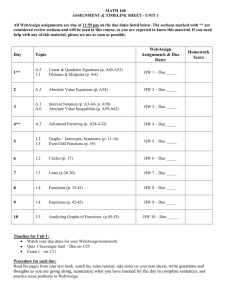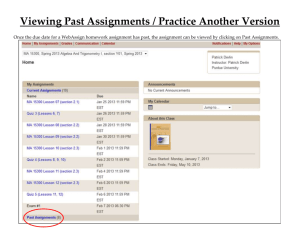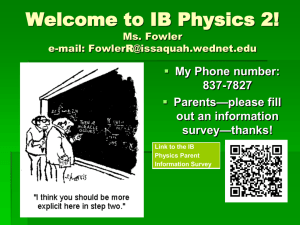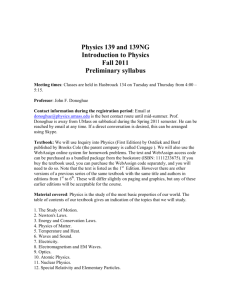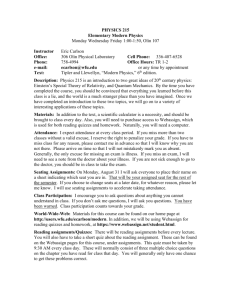AP Summer Assignment 2012
advertisement
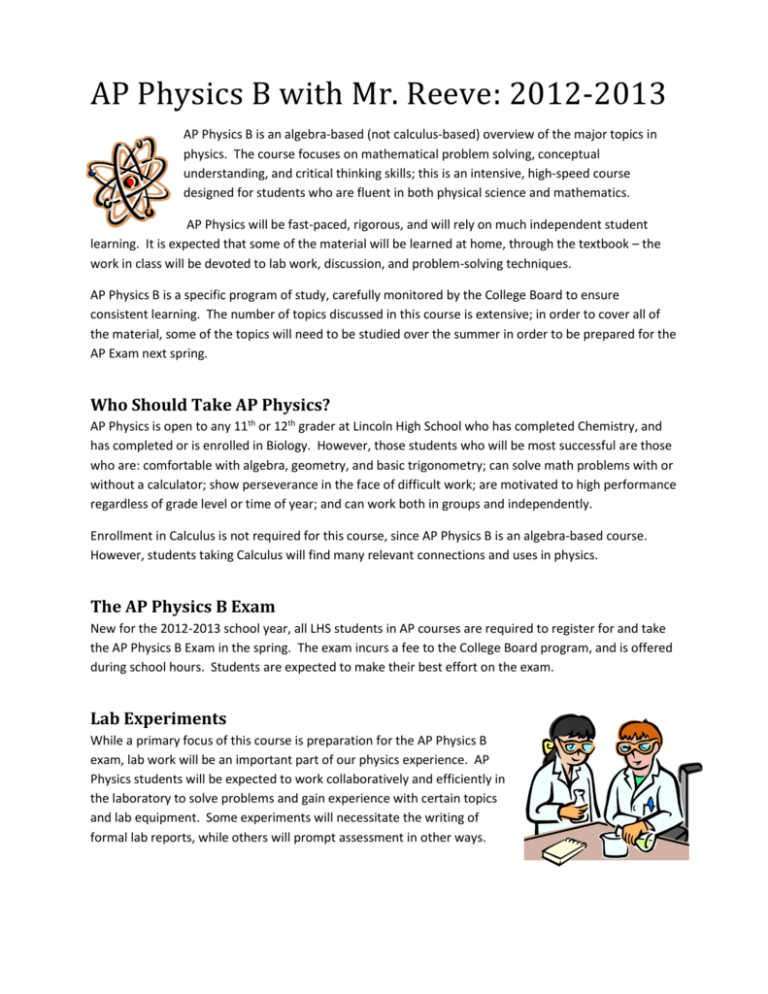
AP Physics B with Mr. Reeve: 2012-2013 AP Physics B is an algebra-based (not calculus-based) overview of the major topics in physics. The course focuses on mathematical problem solving, conceptual understanding, and critical thinking skills; this is an intensive, high-speed course designed for students who are fluent in both physical science and mathematics. AP Physics will be fast-paced, rigorous, and will rely on much independent student learning. It is expected that some of the material will be learned at home, through the textbook – the work in class will be devoted to lab work, discussion, and problem-solving techniques. AP Physics B is a specific program of study, carefully monitored by the College Board to ensure consistent learning. The number of topics discussed in this course is extensive; in order to cover all of the material, some of the topics will need to be studied over the summer in order to be prepared for the AP Exam next spring. Who Should Take AP Physics? AP Physics is open to any 11th or 12th grader at Lincoln High School who has completed Chemistry, and has completed or is enrolled in Biology. However, those students who will be most successful are those who are: comfortable with algebra, geometry, and basic trigonometry; can solve math problems with or without a calculator; show perseverance in the face of difficult work; are motivated to high performance regardless of grade level or time of year; and can work both in groups and independently. Enrollment in Calculus is not required for this course, since AP Physics B is an algebra-based course. However, students taking Calculus will find many relevant connections and uses in physics. The AP Physics B Exam New for the 2012-2013 school year, all LHS students in AP courses are required to register for and take the AP Physics B Exam in the spring. The exam incurs a fee to the College Board program, and is offered during school hours. Students are expected to make their best effort on the exam. Lab Experiments While a primary focus of this course is preparation for the AP Physics B exam, lab work will be an important part of our physics experience. AP Physics students will be expected to work collaboratively and efficiently in the laboratory to solve problems and gain experience with certain topics and lab equipment. Some experiments will necessitate the writing of formal lab reports, while others will prompt assessment in other ways. Curriculum Outline The College Board rigorously checks that all important concepts in physics are covered in this course. Below is a condensed outline of the topics to be covered in before the AP Exam. Student completion of the Summer Assignment will be vital in order to cover this many topics in the time alloted before the AP Exam in May. Unit 1: Newtonian Mechanics 1. 2. 3. 4. 5. 6. Kinematics a. Constant Speed & Velocity b. Constant Acceleration c. Vectors d. Projectile Motion Forces a. Newton’s Laws b. Friction c. Inclined Planes d. Equilibrium & Vectors Mechanical Energy a. Work & Power b. Kinetic Energy and Potential Energy c. Conservation of Energy Linear Momentum a. Impulse & Conservation of Momentum b. 1-D Collisions c. 2-D Collisions Circular Motion, Universal Gravitation, Rotation, and Torque a. Centripetal Acceleration & Force b. Universal Gravitation, Satellite Motion, & Kepler’s Laws c. Linear Momentum and Torque Simple Harmonic Oscillators a. Pendula b. Oscillating Springs Unit 2: Fluid Mechanics and Thermal Physics 1. 2. Fluid Mechanics a. Pressure and rate of Flow b. Bernoulli’s principle Heat and Temperature, and Thermodynamics a. Gas Laws b. Molecular kinetic energy c. Laws of Thermodynamics d. Pressure-volume-work cycles Unit 3: Electricity and Magnetism 1. 2. 3. 4. Electrostatics a. Charge & Coulomb’s Law b. Conductors & Insulators c. Capacitance Electric Circuits a. Voltage, Resistance, Power b. Ohm’s Law c. Series & Parallel Circuits Magnetic Fields a. Sources of Magnetism b. Magnetic Field Lines Electromagnetism a. Electromagnetic inductance b. Forces on moving charges Unit 4: Waves and Optics 1. 2. 3. Principles of Waves and Sound a. Characteristics of Waves b. Sound Waves & Speed of Sound Light and Electromagnetic Waves a. Nature and Speed of Light b. Electromagnetic Spectrum Optics, Reflection and Refraction a. Reflection and Refraction b. Interference and Diffraction c. Single- and Double-Slit Interference Unit 5: Atomic and Nuclear Physics 1. 2. Atomic Structure and Quantum Effects a. Sub-atomic Particles b. Energy Levels in the Atom c. The Photoelectric effect d. DeBroglie wavelengths Nuclear Structure and Energy a. Radioactivity b. Nuclear Forces c. Nuclear Fission and Nuclear Energy Necessary Supplies for Class Students in this course will need these supplies: Textbook: Cutnell & Johnson, Physics, 8th Ed. John Wiley & Sons, 2009, available on loan from Mr. Reeve – you will need this textbook over the summer Calculator: a scientific calculator (with trig functions) is required. TI Graphing calculators (except those with a QWERTY keyboard) are most useful – however, a scientific non-graphing calculator will also suffice. Calculators are not allowed on some parts of the exam, so there will be times in class when the calculator is required, and other times when it is not allowed. WebAssign account: an online account for physics homework (see below) Optional text: an exam review book is suggested for this course, in order to best review for tests and prepare for the AP exam. I highly recommend AP Advantage: Physics B by James Mooney, 2004, Peoples Publishing Group Inc (ISBN 978-1413804918) which is available through a number of online book vendors. However, other review books are available and are acceptable. This book will not be used in class, but is for your own study and review. WebAssign Software In order to complete summer homework assignments (and assignments throughout the school year), students will need a WebAssign account. WebAssign is an online math and science homework system that allows teachers to assign textbook problems that are numerically unique for each student. Students complete the assignments at home and enter the answers online. Grading and feedback is immediate, and students can (on some assignments) keep re-submitting the homework to improve their performance. The WebAssign account costs about $10.00 per student per class per school year, June to June. Families that feel they cannot afford the cost of the account should contact Mr. Reeve as soon as possible. Mr. Reeve’s WebAssign class becomes active at noon on June 9. Use the Class Key below to create an account and make online payment directly to WebAssign. Be sure to sign up before June 23, since this is when the first assignment is due! Webassign Class Key: lincolnhs.ri 4805 Course Grading There will be several components to the grading structure in AP Physics. Tests: 100 pts each Lab Work: 30-50 pts each Quizzes: 30-50 pts each Homework and Practice Assignments: 20-50 pts each Other Special Assignments: varies 9830 Summer Assignment The Summer Assignments are not just to keep students busy – we will use the summer months to cover topics that can then be quickly reviewed in class. Grading: Summer Assignment #0: 20 points Summer Assignment #1: 40 points Summer Assignment #2: 40 points Summer Assignment #3: 40 points Summer Assignments Quiz: 40 points Total: 180 points Due June 18, 2012, 11:59 PM Due July 12, 2012, 11:59 PM Due August 2, 2012, 11:59 PM Due August 23, 2012, 11:59 PM 3rd class of the school year An ability to work thoroughly and independently is a prerequisite for the course. However, this does not mean students must work in isolation, nor does it mean that you should be able to complete assignments without effort. Students are encouraged to form study/homework groups that can meet in the summer, and to contact Mr. Reeve frequently with any questions, large or small. Students who have questions about the summer assignment or other issues can ask Mr. Reeve by email MrReeveLHS@gmail.com or ReeveT@LincolnPS.org, or by text message at 862-4103. However, don't wait until the last minute to ask questions, or you might not get the answers in time! Students who will be on vacation for certain weeks of the summer should finish upcoming assignments well in advance of the due dates. Extensions will not be given for family vacations, except under extraordinary unforeseeable circumstances. Students who will have no access to the internet for the summer should see Mr. Reeve for a paper-and-pencil version of the assignment. Students who do not wish to complete the Summer Assignments are encouraged to visit their Guidance Counselor to enroll in a less demanding course, such as Introduction to Deli Meats (1 credit) or Basic Pencil Sharpening (1 credit). Summer Assignments Schedule Summer Assignment 0: WebAssign Tutorial Login to WebAssign, and complete payment. Complete “Intro to WebAssign” assignment online Summer Assignment 1: Science & Math Skills Due: August 10, 11:59 PM Read Chapter 2 in the text Complete WebAssign Problem Set #2 Summer Assignment 3: Two-Dimensional Motion Due: July 15, 11:59 PM Read Chapter 1 in the text. Complete WebAssign Problem Set #1 Summer Assignment 2: One-Dimensional Motion Due: June 23, 11:59 PM Due: August 29, 11:59 PM Read Chapter 3 in the text Complete WebAssign Problem Set Summer Assignments Grading In WebAssign, you can submit your answers multiple times. For example, if you get Question #5 wrong, you can try again. This allows you to get instant feedback on how well you are doing, and to get an immediate chance to try again and improve your grade. For Summer Assignments, you get 2 “free” full-credit submissions on most word problems. Each submission after your second one gets a 15% deduction. This is to encourage you to get the answers right the first (or second) time without wild guessing. However, after the first 2 tries, you can continue to make submissions and attempts, but with an increasing point penalty. Example: Question #5 (worth 2 points): What is 6÷2(2+1)? 1st Try (full credit): 2nd Try (full credit): 3rd Try (-15%): 4th Try (-30%): 2 1 3 9 wrong wrong wrong correct 0/2 points 0/2 points 0/2 points 1.4/2 points For multiple choice questions, the same rules apply, except that one only get 1 “free” try before deductions start. AP Physics Book List Ex. 1 2 3 4 5 6 7 8 9 10 11 12 Name Grade Book # Best Summer Contact (Text Message # or E-mail Address) Mr. Reeve 12 09-003 reevet@lincolnps.org
